Strontium Hawk (240GB) Review
by Kristian Vättö on June 25, 2013 8:00 AM ESTAnandTech Storage Bench 2011
Two years ago we introduced our AnandTech Storage Bench, a suite of benchmarks that took traces of real OS/application usage and played them back in a repeatable manner. Anand assembled the traces out of frustration with the majority of what we have today in terms of SSD benchmarks.
Although the AnandTech Storage Bench tests did a good job of characterizing SSD performance, they weren't stressful enough. All of the tests performed less than 10GB of reads/writes and typically involved only 4GB of writes specifically. That's not even enough exceed the spare area on most SSDs. Most canned SSD benchmarks don't even come close to writing a single gigabyte of data, but that doesn't mean that simply writing 4GB is acceptable.
Originally we kept the benchmarks short enough that they wouldn't be a burden to run (~30 minutes) but long enough that they were representative of what a power user might do with their system. Later, however, we created what we refer to as the Mother of All SSD Benchmarks (MOASB). Rather than only writing 4GB of data to the drive, this benchmark writes 106.32GB. This represents the load you'd put on a drive after nearly two weeks of constant usage. And it takes a long time to run.
1) The MOASB, officially called AnandTech Storage Bench 2011—Heavy Workload, mainly focuses on the times when your I/O activity is the highest. There is a lot of downloading and application installing that happens during the course of this test. Our thinking was that it's during application installs, file copies, downloading, and multitasking with all of this that you can really notice performance differences between drives.
2) We tried to cover as many bases as possible with the software incorporated into this test. There's a lot of photo editing in Photoshop, HTML editing in Dreamweaver, web browsing, game playing/level loading (Starcraft II and WoW are both a part of the test), as well as general use stuff (application installing, virus scanning). We included a large amount of email downloading, document creation, and editing as well. To top it all off we even use Visual Studio 2008 to build Chromium during the test.
The test has 2,168,893 read operations and 1,783,447 write operations. The IO breakdown is as follows:
| AnandTech Storage Bench 2011 - Heavy Workload IO Breakdown | ||||
| IO Size | % of Total | |||
| 4KB | 28% | |||
| 16KB | 10% | |||
| 32KB | 10% | |||
| 64KB | 4% | |||
Only 42% of all operations are sequential; the rest ranges from pseudo to fully random (with most falling in the pseudo-random category). Average queue depth is 4.625 IOs, with 59% of operations taking place in an IO queue of 1.
Many of you have asked for a better way to really characterize performance. Simply looking at IOPS doesn't really say much. As a result we're going to be presenting Storage Bench 2011 data in a slightly different way. We'll have performance represented as Average MB/s, with higher numbers being better. At the same time we'll be reporting how long the SSD was busy while running this test. These disk busy graphs will show you exactly how much time was shaved off by using a faster drive vs. a slower one during the course of this test. Finally, we will also break out performance into reads, writes, and combined. The reason we do this is to help balance out the fact that this test is unusually write intensive, which can often hide the benefits of a drive with good read performance.
There's also a new light workload for 2011. This is a far more reasonable, typical every day use case benchmark. It has lots of web browsing, photo editing (but with a greater focus on photo consumption), video playback, as well as some application installs and gaming. This test isn't nearly as write intensive as the MOASB but it's still multiple times more write intensive than what we were running last year.
We don't believe that these two benchmarks alone are enough to characterize the performance of a drive, but hopefully along with the rest of our tests they will help provide a better idea. The testbed for Storage Bench 2011 has changed as well. We're now using a Sandy Bridge platform with full 6Gbps support for these tests.
AnandTech Storage Bench 2011—Heavy Workload
We'll start out by looking at average data rate throughout our heavy workload test:
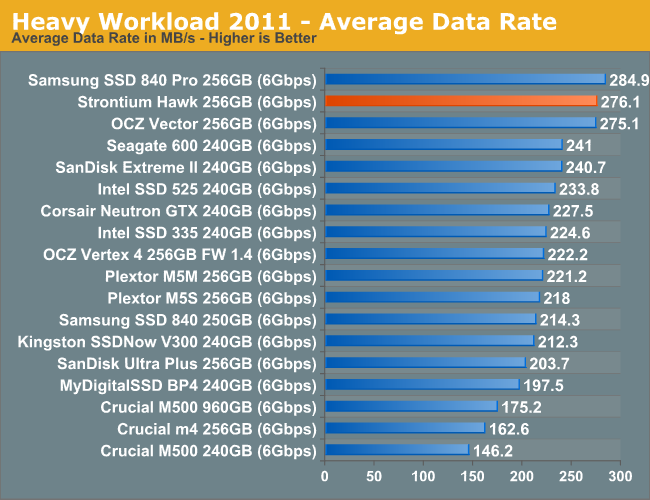
The high sequential throughput and peak performance is highlighted in our Heavy suite.
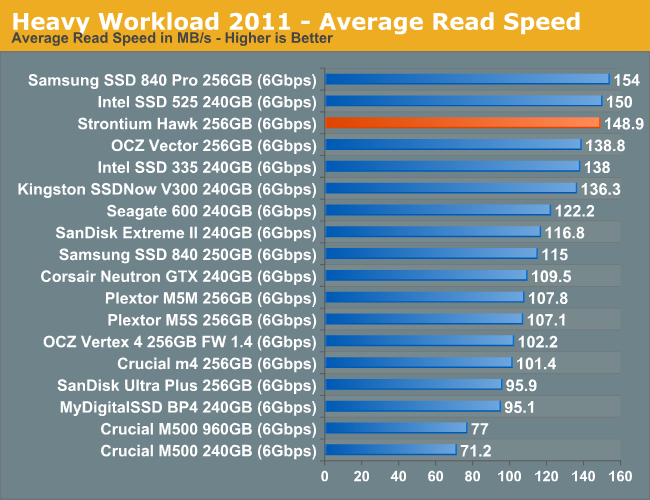
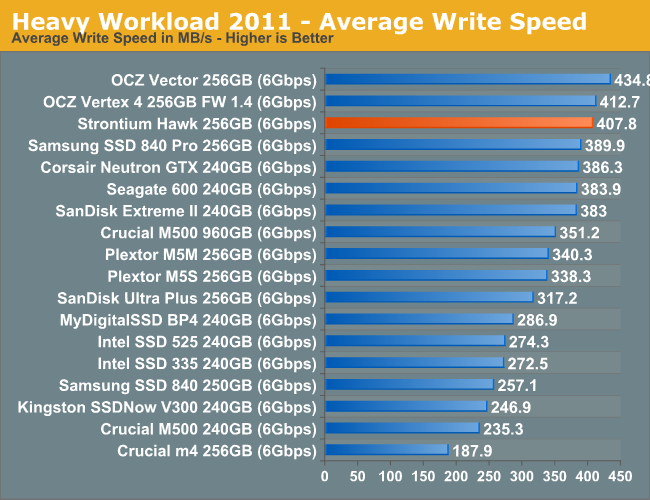
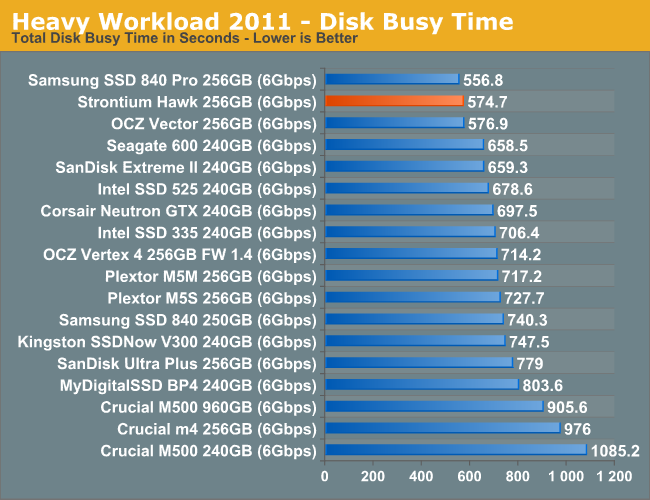
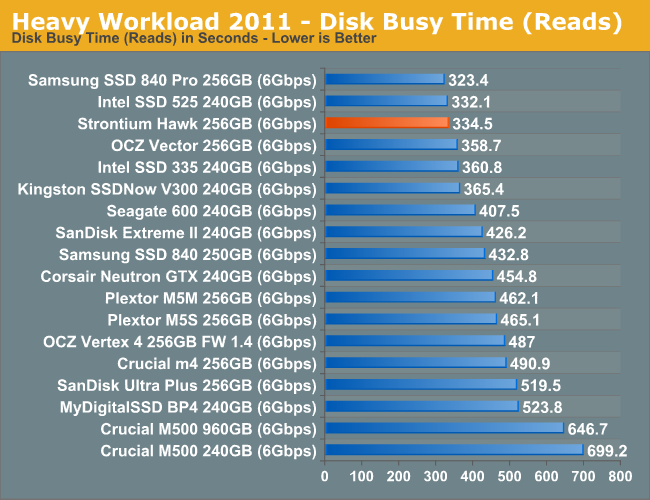
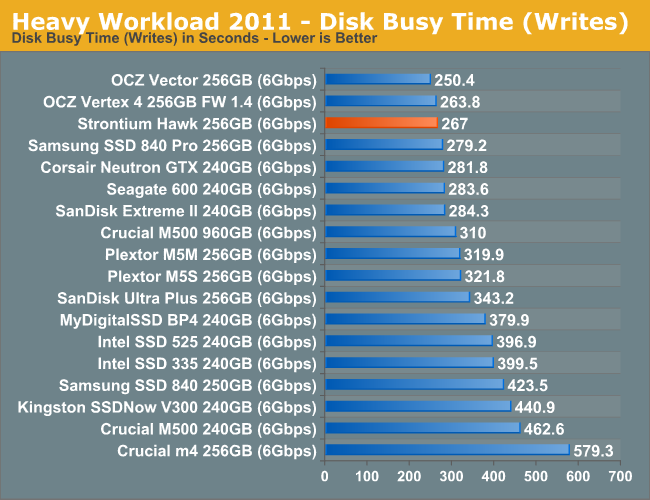










26 Comments
View All Comments
Kristian Vättö - Tuesday, June 25, 2013 - link
That's different. Apple doesn't hide the fact that they've updated the iPad, the least they do is release a press release. I agree that calling third-gen iPad the "iPad 3" and then going back to just "iPad" wasn't the best move from Apple, but it was understandable as the naming would quickly get stupid (imagine e.g. iPad 11). Apple has always been doing that with the MacBook Pros for instance.Strontium did nothing to let the public know that they've changed suppliers, hence the suspicion. No press release, no mention in the product page, nothing. Like I said in the article, we are the first to report about this - I even thought I'm reviewing a SandForce drive until I took the drive apart.
gamoniac - Tuesday, June 25, 2013 - link
Great review. Not a bad drive at all. Unfortunately it is overshadowed by the GB vs GiB and Hawk vs Python issues. I don't mind owning one if reliability is their focus. Now the other deciding factors are warranty and customer service. If they can build up a good reputation, they will have a good following.toytanks - Wednesday, June 26, 2013 - link
I just purchased a the Samsung 840 Pro 256GB. Does anyone know how much of a difference it would make to use this instead, in terms of battery life?LB-ID - Wednesday, June 26, 2013 - link
Absolutely not, and you're a fool soon parted from your money if you do.zjozjom - Wednesday, June 26, 2013 - link
for all you thinking samsung 840 pro the best drive, getting brain washed only to see the destroyer benchmark owns it =(yeahhh look at the inconsistent write for sandisk extreme II under hd tach yet it destroys samsung 840 pro due to ncache LOL gj sandisk, samsung stop brain wash people thanks, people stop being retards thanks yeah
hemlock44 - Thursday, June 27, 2013 - link
Should they ever plan to sell in Italy, I strongly suggest a name change, because "Strontium" recalls a scatological term here :-)